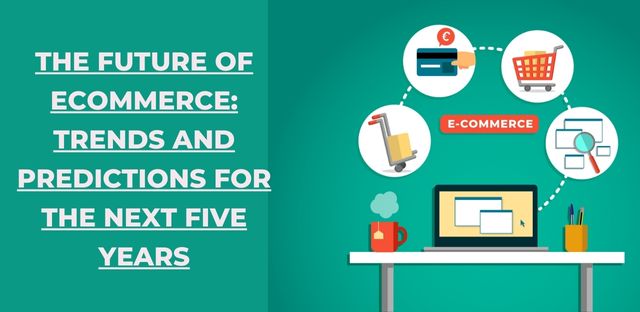The eCommerce industry has grown significantly in the past decade and is expected to continue its upward trajectory in the years to come. With the pandemic accelerating the shift towards online shopping, the eCommerce landscape is evolving at a rapid pace, and businesses need to keep up with the latest trends and predictions to stay ahead of the competition.
In this blog, we will explore some of the emerging trends and predictions that will shape the future of eCommerce over the next five years.

Mobile Shopping
The rise of smartphones has transformed the way consumers shop online, with mobile eCommerce accounting for a significant portion of online sales. According to a report by Statista, mobile eCommerce sales are expected to reach $3.56 trillion by 2021. As such, businesses need to prioritize creating mobile-friendly eCommerce websites and investing in mobile apps to ensure a seamless shopping experience for their customers.
Social Commerce
Social media platforms such as Facebook, Instagram, and Pinterest are increasingly becoming an integral part of the ecommerce landscape. Social commerce enables businesses to sell their products directly on social media platforms, making the shopping experience more convenient for consumers. According to a report by eMarketer, social commerce sales are expected to reach $36.62 billion by 2021. Businesses that leverage social commerce effectively will have a competitive advantage in the years to come.
Personalization
Personalization is another trend that will shape the future of ecommerce. Consumers are looking for personalized shopping experiences that cater to their unique preferences and needs. As such, businesses need to invest in technologies such as machine learning and artificial intelligence to personalize the shopping experience for their customers. Personalization can help increase customer loyalty, drive sales, and enhance customer satisfaction.
Augmented Reality
Augmented reality (AR) is another technology that will transform the ecommerce industry. AR enables consumers to visualize products in real-world environments before making a purchase, providing a more immersive and engaging shopping experience. According to a report by Gartner, 100 million consumers will shop using AR by 2021. Businesses that incorporate AR into their ecommerce strategy will have a competitive advantage over those that do not.
Voice Commerce
The rise of smart speakers such as Amazon Echo and Google Home is driving the growth of voice commerce. Voice commerce enables consumers to order products using voice commands, making the shopping experience more convenient. According to a report by OC&C Strategy Consultants, voice commerce sales are expected to reach $40 billion by 2022. Businesses that integrate voice commerce into their ecommerce strategy will be better positioned to meet the needs of consumers who prefer voice-based interactions.
In conclusion, the ecommerce industry is evolving at a rapid pace, and businesses need to stay ahead of the latest trends and predictions to succeed. Mobile shopping, social commerce, personalization, augmented reality, and voice commerce are some of the emerging trends that will shape the future of ecommerce over the next five years. By embracing these trends and investing in the latest technologies, businesses can deliver an exceptional shopping experience to their customers and stay ahead of the competition.







Post your comments
You must be logged in to post a comment.